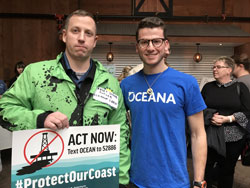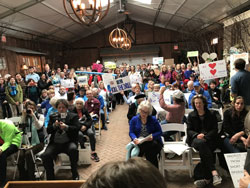University alumnus Zack Karvelas represented Oceana at the New Jersey Citizen’s Rally to insist on ocean preservation and to counter plans by U.S. President Donald Trump’s administration to open a majority of the Atlantic coast for off-shore drilling for fossil fuels.
On Wednesday, Feb. 14 businesses, congressmen, scientists, and environmentalists gathered in Hamilton, NJ to give the people an opportunity to voice their concerns and oppositions against potential plans to drill along the coast.
Trump’s Executive Order 13795, signed on April 28, 2017, if pursued, will remove current regulation that preserves the coasts and seabeds in exchange for opening these areas to oil and gas drilling by various controversial means of extraction.
Karvelas, a member of the graduating class of 2017, represented Oceana, one of the world’s largest international conservation organization focused on ocean protection at the event as a grassroots field intern.
According to Karvelas, the U.S. Bureau of Ocean Energy Management (BOEM) is hosting meetings with parties interested in the executive order without offering the public an opportunity to speak directly to the assembled attendees beyond a written comment via mail or online submissions.
“The BOEM representatives speak strictly about how the potential coastal exploration is safe and whatever it is you want to hear in order to support it, but does not give opportunity for the public to voice their opposition. We host press conferences and public testimony to give people opportunity to be heard, and show how strongly opposed the public is,” said Karvelas.
“The Department of the Interior purposefully does not hold these meetings in the coastal communities because that is where they are going to face the most opposition against their proposals,” said Karvelas. “Coastal communities would be the first and worst affected if there was a spill. These hearings are held in places where there may be less opposition, the counter-rally creates a voice for those in the coastal environment.”
 At the event, Oceana used data to show that each of the meetings have been at least 34 miles away from coastal communities, and some have been as far away as 504 miles.
At the event, Oceana used data to show that each of the meetings have been at least 34 miles away from coastal communities, and some have been as far away as 504 miles.
The event was organized by Clean Ocean Action (COA), according to Karvelas. COA scheduled several elected officials to speak via Skype, including New Jersey Governer Phil Murphy and New Jersey senators Corey Booker and Robert Menendez.
“Every Eastern Seaboard State, and many of their congressional representatives, have come out in opposition to this plan,” said Thomas Herrington, Ph.D., Associate Director of the Urban Coast Institute (UCI), . “This is the only opportunity for the public to show their opposition to the plan, and maybe the only change there is to prevent drilling off the East Coast.”
There were also representatives from many well-known environmental organizations including Surfrider Foundation, NY/NJ Baykeepers, Alliance for a Living Ocean, Save Barnegat Bay, Delaware Riverkeeper Network, New Jersey Sierra Club, Environment New Jersey, and the NJ Historical Club, with support from coastal residents, citizens, business owners, and fisherman. All spoke in solidarity against the future of coastal plans.
Herrington referred to three main reasons why the meetings are controversial, the first being potential damage to the environment and the economy posed by offshore drilling. A large oil spill has the potential to kill marine organisms and has a high probability of washing up on shore, which would damage the $20 billion annual tourism economy.
He also stated that many people feel that it is irresponsible for the United States to drill for and be dependent on hydrocarbon-based fuels, which are warming the planet and causing significant global climate changes. He also believes that allowing large oil companies to lease the seabed for drilling means the government is providing big businesses with access to natural resources at the expense of the American public.
Herrington explained that the complexity of offshore oil and gas production is dangerous. The drilling platforms go through the ocean wells and then hundreds of feet into the sea beds. Despite the safety systems in place, these platforms allow small amounts of oil to be released into the ocean, which is bad for marine life.
“There is always a chance that a storm or an accident (hurricane, explosion, a well blow out like the BP oil spill in the Gulf of Mexico) will release hundreds of thousands of gallons of oil into the ocean,” Herrington added. “On the flip side, energy professionals want to reduce the U.S. dependence on foreign oil and want to utilize the national resources present within our own borders.”
However, according to Herrington, many experts view that the amount of oil available off of the East Coast as very limited.
“Drilling in the ocean and the inevitable spills are environmentally disastrous. I would like to see more support for sustainable energy sources. This needs to the future of energy – it means jobs, clean air, land, and water – you don’t need to be a visionary leader to know we will get left behind by other countries who are leading the way,” said Chris Hirschler, Ph.D., Chair of the Department of Health and Physical Education.
During the last few hours of the event, oral testimony was recorded by a reporter who will submit the three-minute oral testimonies of over 70 citizens for BOEM to consider.
As a representative of Oceana and passionate environmentalist, Karvelas provided educational literature, simple opportunities to voice opposition, and support in pushing legislation against dangerous practices at the rally.
“It’s all about defense, we react to threats against ocean health and coastal communities and help people opposed to these threats, to use methods of writing comments in, and getting tools to make a difference themselves,” said Karvelas.
While at Monmouth, Karvelas practiced and grew his passion for the ocean as an ocean/nature photographer, and as a member of Plants for Peace, a vegan/vegetarian organization on campus and an environmental journalist.
“Zack always made his interest in the environment known in class. He would write news stories and passionate editorials about protecting the oceans in journalism classes. In my class called Creating a Culture of Peace, he helped other students see how environmental pollution was a form of violence they hadn’t thought about before. His classmates were inspired by his good-natured commitment to protecting the oceans because it was something he really lives”, said Eleanor Novek, Ph.D., a communication professor.
“I wouldn’t be here if it wasn’t for Monmouth. It is less than a mile from beach, I found my interest an admiration for the ocean while going to school there and living right on the ocean. It created a happy environment for people to learn to thrive, and the ocean called to me. My interest developed over my four years into passion and now my career,” said Karvelas.
John Morano, Faculty Advisor of The Outlook, professor of journalism, and author of the Morano eco-adventure series, said, “I do recall that when Zack and I discussed environmental issues and their place in journalism, he was especially engaged. It really lit a fire in him. Some would call that passion.”
The Presidents of The World Wildlife Fund, The Nature Conservancy and The Ocean Conservancy have written introductions to Morano’s environmental novels.
“It wouldn’t surprise me if one day an introduction to one of my books was written by Zack Karvelas on behalf of a major environmental organization,” said Morano.
Mary Harris, a specialist professor of communication, said, “I think Zack is a great example to current students who may want to make a difference for a meaningful cause but don’t know where to get started. It really only takes passion and action to make progress.”
“Zack is modeling Ghandi’s advice: be the change you want to see in the world,” said Hirschler.
PHOTO COURTESY of Zack Karvelas



